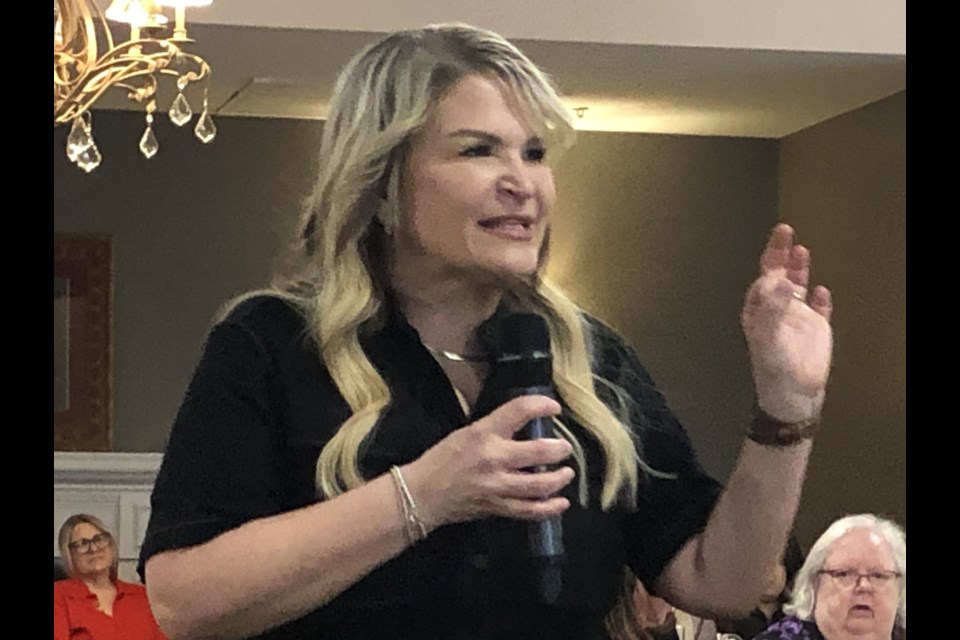MOOSE JAW — The death of a classmate in high school influenced Jody Carrington to become a clinical psychologist because she wanted to emulate her favourite teacher’s calming influence in handling the situation.
“… I remember where Mrs. (Holly) Nordstrom was standing and what she was wearing the day she had to tell us that the then-captain of our hockey team had been killed,” Carrington recalled. “And I remember thinking, even as a 16-year-old kid, if there’s somebody at the helm of (the ship of) Big Emotion, we’re all going to be OK.”
After graduating high school, the teen spent 13 years becoming a clinical psychologist. Decades later, she has made it her goal to serve first responders since they receive very little support addressing their mental wounds and are rarely told “how good they are.”
“You’re only as OK as the people who hold you,” Carrington said to about 100 people on May 15 at Grant Hall, during the Partners Against Violence’s (Moose Jaw and District chapter) “Power of Collaboration” conference.
Wired for connection
Carrington focused on “reconnecting in a disconnected world,” as she pointed out that society is in a loneliness epidemic since humans should do things together but are more disconnected than ever.
She noted that the human brain is “wired for connection,” but it’s difficult for people to make eye contact since there are many opportunities to look away.
“I don’t care how good you get at AI (artificial intelligence), you will never automate relationships. … if you want this community to be more successful than it’s ever been, you will understand that the only AI that matters is authentic interaction,” Carrington said.
Furthermore, society is full of more noise, anxiety and depression than ever — these effects overwhelm people’s nervous systems — while more people are dying from emotional illness than from physical illness, she continued.
“We’re killing ourselves faster from things we can control than from physical illness. What is happening?!” the Olds, Alta., psychologist exclaimed.
Feeling lonely
Carrington presented data showing that 36 per cent of adults report serious loneliness, 50 per cent of young adults feel no one shows them genuine care, 61 per cent of young adults feel lonely always and 51 per cent of mothers with young kids feel lonely often.
Also, data shows that lonely employees have 45 per cent lower productivity, twice the number of days missed at work, a higher risk of turnover and 12 per cent lower quality of work.
Carrington said people need “an emotional language” to connect with others. However, she pointed out that straight, white males have the highest suicide rates in Canada, even though they are considered “the most privileged” in society.
Specifically, data shows that 75 per cent of such deaths are by this group, with 50 per cent of men ages 40 to 64 ending their lives.
Conversely, minority groups have lower suicide rates because they form communities to feel safe, which white men have never had to do before, she added. Now, though, they are forced to compete with everyone, are rarely asked how they’re doing and have never been taught how to communicate.
The body keeps the score
Meanwhile, Carrington said humans are more sleep-deprived than ever — affecting the brain and nervous system — and have more fragmented attention spans that cause them to ignore the people they work with, love or lead.
“Our body keeps the score,” she remarked. “So every time we’re getting notifications (on phones or watches) … imagine what’s happening to the cortisol all day long?”
It’s difficult to fight these problems because tech giants Amazon, Uber, Apple and Meta have a market capitalization rate of $8.49 trillion and work to keep people divided and distracted since that’s “big business,” Carrington continued.
Walking with others
One quote that changed Carrington’s life was by Ram Daas, who said, “We’re all just here walking each other home.” She noted that many people experience emotional dysregulation, so if they are surrounded by “walkers” or emotionally grounded leaders, they can develop emotional regulation.
However, the three ingredients that cause people to “flip their lids” include uncertainty, fear and the feeling of no end in sight for problems, she continued. An event that contained all three ingredients — and that will have long-term ramifications — was the coronavirus pandemic.
“If we are all experiencing this, particularly those of us doing the serving, our ability to teach it is one thing I’m worried about the most,” Carrington continued. “If the people big people aren’t OK, the little people don’t stand a chance.”
Redefining trauma
Carrington said trauma should be defined as “any experience encoded in terror.” Moreover, it is a psychological injury that should be treated efficiently and with the most effective intervention to heal.
The psychologist noted that first responders usually experience trauma when responding to situations. Their problem is the debrief meetings afterward are “watered down” since they’re never asked where they’re feeling their emotions. Data shows they feel emotional pressure in their abdomen, which remains stuck there and prevents them from doing their jobs.
“When you walk people through trauma, the only way you can heal is in the hands of another person,” said Carrington.
Carrington also addressed burnout, saying people who see “tough stuff” all day lose the capacity to fill up emotionally. Burnout includes emotional exhaustion, losing the capacity to be compassionate and experiencing futility — or “your give-a-(crap ability) is broken.”
One way to address this problem is to acknowledge people since that makes them feel good, she added.
Visit www.drjodycarrington.com for more information.




